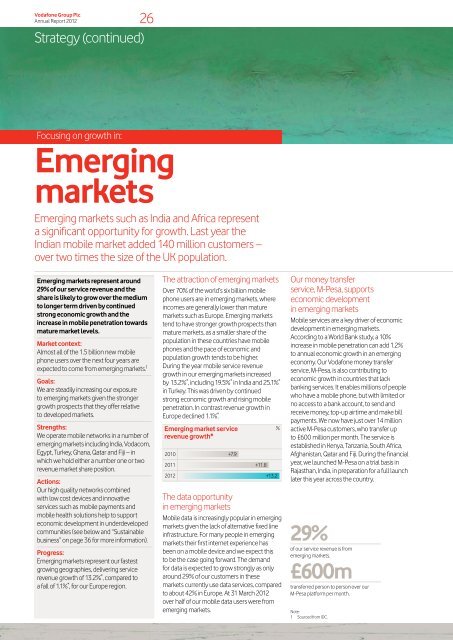Vodafone Group Plc Annual Report for the year ended 31 March 2012
Vodafone Group Plc Annual Report for the year ended 31 March 2012
Vodafone Group Plc Annual Report for the year ended 31 March 2012
Create successful ePaper yourself
Turn your PDF publications into a flip-book with our unique Google optimized e-Paper software.
<strong>Vodafone</strong> <strong>Group</strong> <strong>Plc</strong><br />
<strong>Annual</strong> <strong>Report</strong> <strong>2012</strong><br />
26<br />
Strategy (continued)<br />
Focusing on growth in:<br />
Emerging<br />
markets<br />
Emerging markets such as India and Africa represent<br />
a significant opportunity <strong>for</strong> growth. Last <strong>year</strong> <strong>the</strong><br />
Indian mobile market added 140 million customers –<br />
over two times <strong>the</strong> size of <strong>the</strong> UK population.<br />
Emerging markets represent around<br />
29% of our service revenue and <strong>the</strong><br />
share is likely to grow over <strong>the</strong> medium<br />
to longer term driven by continued<br />
strong economic growth and <strong>the</strong><br />
increase in mobile penetration towards<br />
mature market levels.<br />
Market context:<br />
Almost all of <strong>the</strong> 1.5 billion new mobile<br />
phone users over <strong>the</strong> next four <strong>year</strong>s are<br />
expected to come from emerging markets. 1<br />
Goals:<br />
We are steadily increasing our exposure<br />
to emerging markets given <strong>the</strong> stronger<br />
growth prospects that <strong>the</strong>y offer relative<br />
to developed markets.<br />
Strengths:<br />
We operate mobile networks in a number of<br />
emerging markets including India, Vodacom,<br />
Egypt, Turkey, Ghana, Qatar and Fiji – in<br />
which we hold ei<strong>the</strong>r a number one or two<br />
revenue market share position.<br />
Actions:<br />
Our high quality networks combined<br />
with low cost devices and innovative<br />
services such as mobile payments and<br />
mobile health solutions help to support<br />
economic development in underdeveloped<br />
communities (see below and “Sustainable<br />
business” on page 36 <strong>for</strong> more in<strong>for</strong>mation).<br />
Progress:<br />
Emerging markets represent our fastest<br />
growing geographies, delivering service<br />
revenue growth of 13.2% * , compared to<br />
a fall of 1.1% * , <strong>for</strong> our Europe region.<br />
The attraction of emerging markets<br />
Over 70% of <strong>the</strong> world’s six billion mobile<br />
phone users are in emerging markets, where<br />
incomes are generally lower than mature<br />
markets such as Europe. Emerging markets<br />
tend to have stronger growth prospects than<br />
mature markets, as a smaller share of <strong>the</strong><br />
population in <strong>the</strong>se countries have mobile<br />
phones and <strong>the</strong> pace of economic and<br />
population growth tends to be higher.<br />
During <strong>the</strong> <strong>year</strong> mobile service revenue<br />
growth in our emerging markets increased<br />
by 13.2% * , including 19.5% * in India and 25.1% *<br />
in Turkey. This was driven by continued<br />
strong economic growth and rising mobile<br />
penetration. In contrast revenue growth in<br />
Europe declined 1.1% * .<br />
Emerging market service<br />
revenue growth*<br />
2010<br />
2011<br />
<strong>2012</strong><br />
+7.9<br />
%<br />
+11.8<br />
+13.2<br />
The data opportunity<br />
in emerging markets<br />
Mobile data is increasingly popular in emerging<br />
markets given <strong>the</strong> lack of alternative fixed line<br />
infrastructure. For many people in emerging<br />
markets <strong>the</strong>ir first internet experience has<br />
been on a mobile device and we expect this<br />
to be <strong>the</strong> case going <strong>for</strong>ward. The demand<br />
<strong>for</strong> data is expected to grow strongly as only<br />
around 29% of our customers in <strong>the</strong>se<br />
markets currently use data services, compared<br />
to about 42% in Europe. At <strong>31</strong> <strong>March</strong> <strong>2012</strong><br />
over half of our mobile data users were from<br />
emerging markets.<br />
Our money transfer<br />
service, M-Pesa, supports<br />
economic development<br />
in emerging markets<br />
Mobile services are a key driver of economic<br />
development in emerging markets.<br />
According to a World Bank study, a 10%<br />
increase in mobile penetration can add 1.2%<br />
to annual economic growth in an emerging<br />
economy. Our <strong>Vodafone</strong> money transfer<br />
service, M-Pesa, is also contributing to<br />
economic growth in countries that lack<br />
banking services. It enables millions of people<br />
who have a mobile phone, but with limited or<br />
no access to a bank account, to send and<br />
receive money, top-up airtime and make bill<br />
payments. We now have just over 14 million<br />
active M-Pesa customers, who transfer up<br />
to £600 million per month. The service is<br />
established in Kenya, Tanzania, South Africa,<br />
Afghanistan, Qatar and Fiji. During <strong>the</strong> financial<br />
<strong>year</strong>, we launched M-Pesa on a trial basis in<br />
Rajasthan, India, in preparation <strong>for</strong> a full launch<br />
later this <strong>year</strong> across <strong>the</strong> country.<br />
29%<br />
of our service revenue is from<br />
emerging markets.<br />
£600m<br />
transferred person to person over our<br />
M-Pesa plat<strong>for</strong>m per month.<br />
Note:<br />
1 Sourced from IDC.






